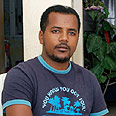
Ethiopian Prisoner of Zion: I'm only asking for recognition
Alongside Prisoners of Zion from former USSR and Arab countries, 369 Ethiopian Prisoners of Zion live in Israel. Yerga Issa is one of them. At five years old, he was jailed in Sudan for five years as his family made its way to Israel: 'Everyone thinks there were only Prisoners of Zion in Europe'
Many people endured great suffering only in order to be able to live with us here in Israel. There are 2,203 Prisoners of Zion living today in Israel, most of them from the former USSR and Muslim countries. These are people who operated under a foreign regime for the advancement of Jews and the Zionist idea, and were jailed for their activity. Some of them were even executed.
The Absorption Ministry will hold an event Thursday in their honor that will present their heritage.
Not many are aware that there are 369 Ethiopian immigrants who are Prisoners of Zion. One of them is Yerga Issa, 26, who was jailed in Sudan for five years along with his parents and siblings.
His childhood years are remembered as one long torture, but, he claims, his true suffering is the lack of recognition as a Prisoner of Zion by the State of Israel.
"No one can bring back my childhood, and that is not what I am asking for. All I am asking for is recognition. Everyone thinks that there were only Prisoners of Zion in Europe, but there were also many Ethiopians. I am ashamed to tell people that I carry the card of a Prisoner of Zion because I know they will laugh at me. I want to believe that this is only an issue of lack of awareness," Yerga said to Ynet.
Yerga and many Jews from the villages in Ethiopia marched to Sudan in 1985 on their way to Israel.
"We always knew that we must go to Israel, but we didn't know how. Fifty-three people took donkeys, horses, and guides and started to march to Sudan. I was five years old then and my parents thought this journey would last two weeks, but it lasted nearly two months.
"The journey was hard. We walked at night and rested during the day because we were afraid of the Sudanese regime and robbers. We weren't allowed to say we were Jews. When we got to Sudan, Red Cross members received us, and gave us food and a place to sleep. But, a day before Yom Kippur, a group of Sudanese soldiers surrounded us and put us on trucks," recalled Yerga.
'Operation best remains untold'
From that day forth, the life of Yerga's family, who always dreamed of moving to Israel, turned into a nightmare."From there, they took us to jail and closed every family in a cell in the middle of the desert. They started interrogated the adults and asking us if we are Jews. In Sudan, Jews aren't free, and are immediately executed. We never said that we are Jewish, and my father said, as did all of the men, that we came from Ethiopia because of the famine.
"Our stay in jail was very difficult. We didn't leave the cell. Whoever had to use the bathroom left with a soldier escort. Two years later, they improved the conditions, and we were allowed to roam freely, and even go to the city," continued Yerga.
A secret Israeli operation, which has yet to be declassified, rescued Yerga and the 52 other Jews in the Sudanese jail.
"They got us out in an operation that best remains untold. From there, they returned us to Ethiopia where we waited another year until we ultimately came to Israel. I appreciate Natan Sharansky and who he represents very much, but I want everyone to know that we too suffered hardships. Until today, I have scars on my face from the blows I received in Sudan," said Yerga.










